Karamani sundal recipe | Black-eyed peas sundal | Thatta payaru sundal | lobia sundal

Looking for a protein-packed snack recipe? Here you go,
Sundal recipes are usually made during the Navaratri festival in the
Southern Part of India and served as prasadam in Temples.
Sundal is a flavorful savory snack that can be eaten at any time of
the day. Further, it is a perfect recipe if you looking to incorporate
different beans and legumes into your daily diet.
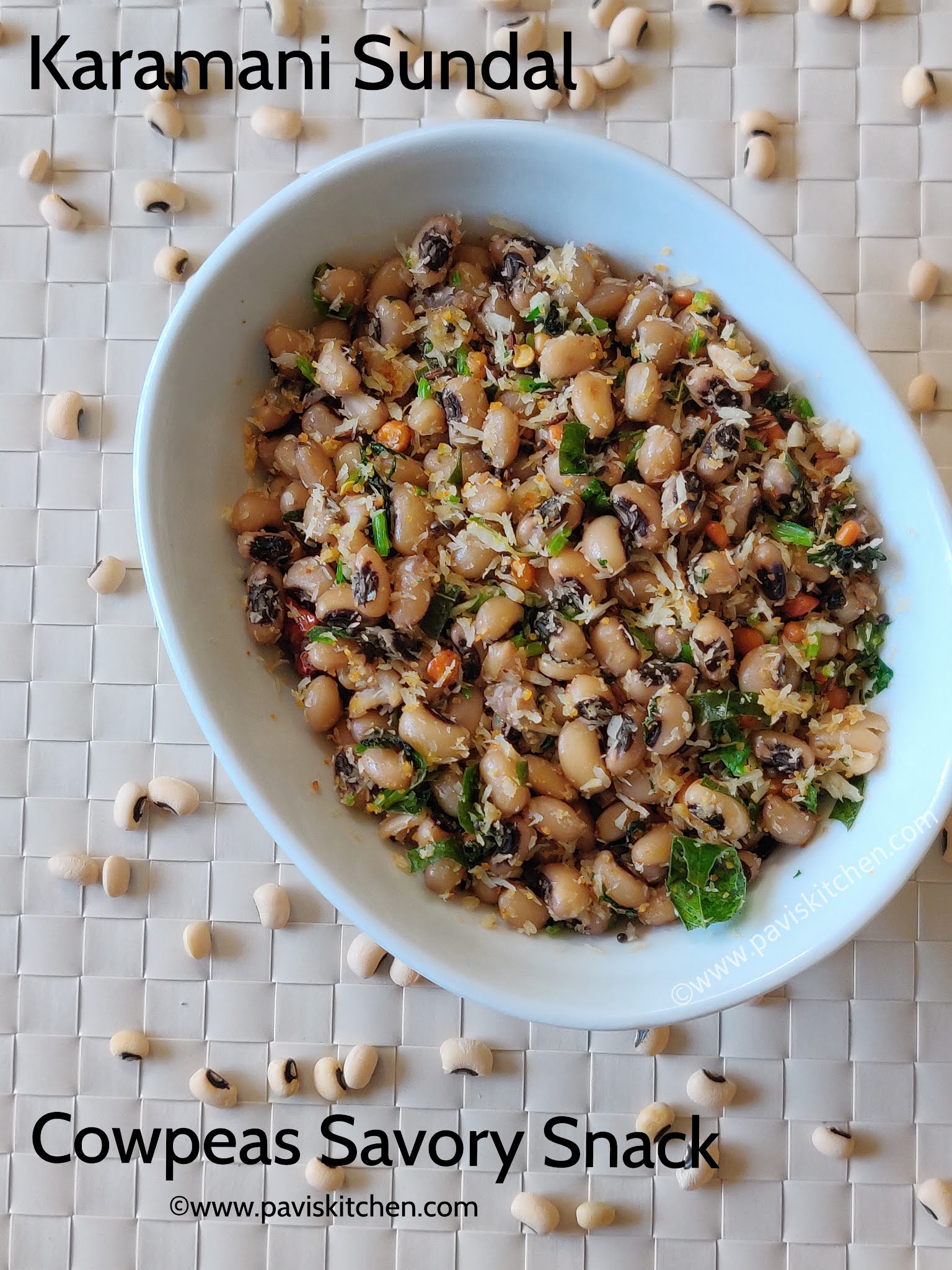
Karamani sundal is a healthy and easy recipe made with steamed
black-eyed peas/beans, chilies, coconut, curry leaves, cilantro, etc. It is
a vegan snack and no onion no garlic recipe. This recipe contains complex
carbs and fiber.
Black-eyed peas sundal keeps you full and satiated for a long time as
it is high in protein. It is usually served as prasadam during the Navaratri
Golu festival. Sundal can be made with different beans and legumes as well.
Karamani sundal is also called perum payiru sundal, cowpeas
sundal, black-eyed beans sundal, lobia sundal, Thatta payaru sundal,
vellai/white karamani sundal, etc.

What is sundal:
Sundal is a Tamil word, which means the lentils/beans/legumes
are soaked, boiled, and seasoned in herb oil(tadka) and finally
flavored with grated coconut and coriander leaves. Sundal is
a snack, usually made with different kinds of lentils, legumes,
pulses, and cereals. It is also sold as a street food snack in
restaurants, parks, and beaches. It can also be served as a
mid-morning or evening snack, along with tea or coffee.
Sundal is a healthy and savory snack recipe. Sundal recipes
are widespread among south Indian and Tamil cuisine. Sundal can be
made with chickpeas, black channa, kollu, mung bean, kidney bean,
black-eyed bean, etc. The spiciness can be adjusted as per your
choice.
White karamani sundal is one of the popular varieties of South
Indian sundal recipes. Sundal is usually served as prasad/prasadham in
Hindu temples and made at home during the Navaratri festival in Tamil
Nadu.

Recipe: Karamani sundal recipe | black-eyed peas sundal | white karamani sundal | lobia sundal | Thatta payiru sundal
Serves - 2
Cuisine - South Indian
Region - Tamilian cuisine
Course - Snack | Prasadam
Prep time - 5 min | Cook time - 20 min | Soaking time - Overnight/8
hours
Diet - Vegan & Vegetarian
Author - Pavithra
Publisher - Pavis kitchen
Ingredients:
Karamani/Cowpeas - 1/2 cup
Water - To soak and boil - 300 ml
Coconut - 2 tbsp grated
Cilantro/Coriander leaves - 4 twigs
Salt - 3/4 tsp or As per taste
Sundal powder - 1 tbsp optional
For seasoning/tadka:
Oil - 1 tsp
Mustard seeds - 1 tsp
Cumin seeds - 1tsp
Channa dal - tsp
Urad dal - 1 tsp
Red chili - 1
Green chili - 1
Curry leaves - 1 sprig
Asafoetida - 1/4 tsp
Notes:
1. Coconut oil gives a nice aroma and flavor to the sundal.
2. Sundal powder/podi is optional.
3. Grated coconut is also optional, and adjust salt and chilies as
per taste.
How to make karamani sundal:
1. Firstly, clean and rinse
the cowpeas/karamani and soak them in water for 12 hours or overnight.

2. Secondly, cook the karamani for 15 minutes on a low medium flame. Add
salt and water. The quantity of water should be enough to immerse the bean,
say 1/4 cup.

3. Thirdly, cover it with a lid and let it cook for 10 mins. Periodically,
stir in-between with a spatula to prevent burning and add some water if the
bean/peas get dry.
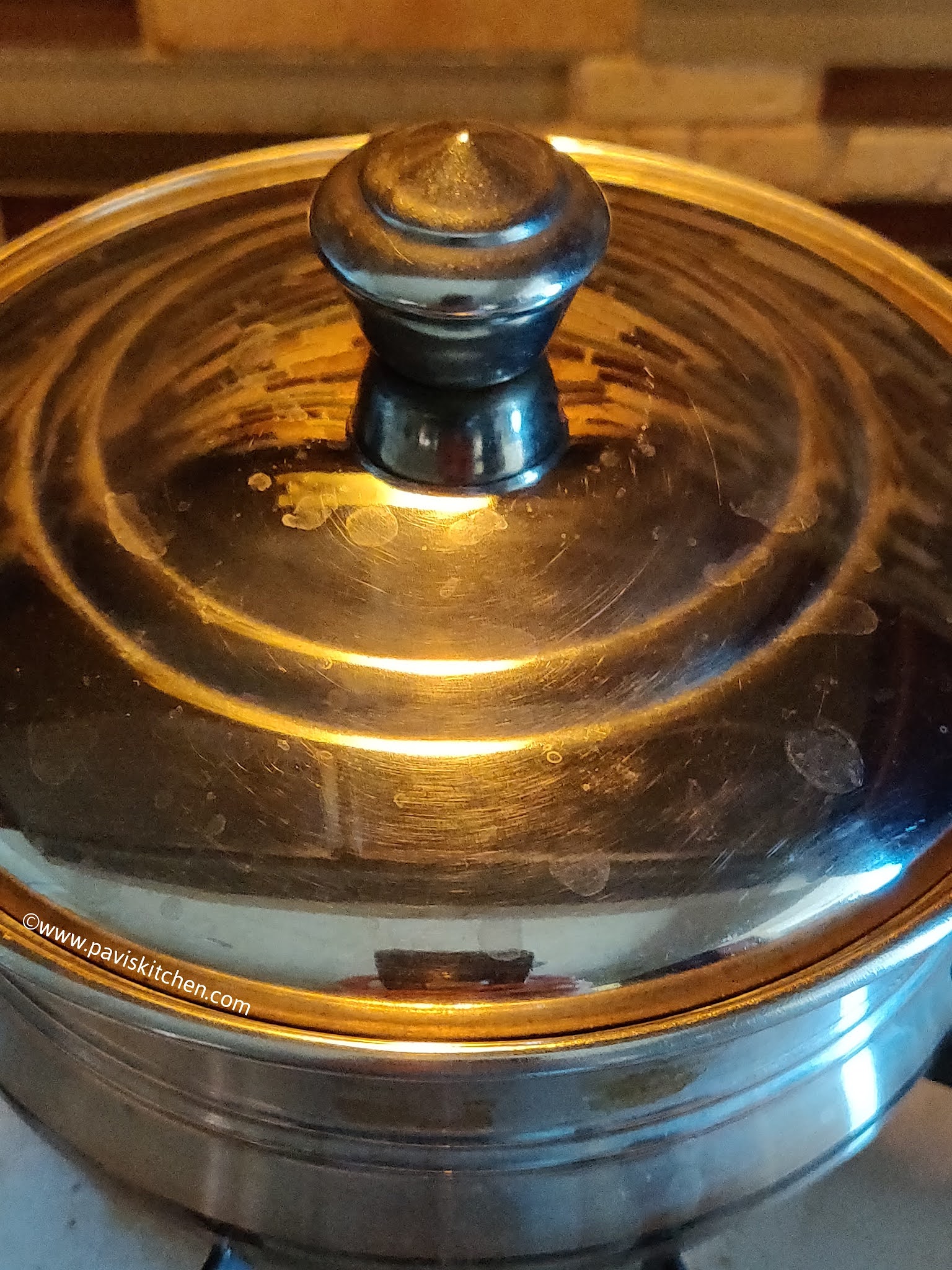
4. The karamani has cooked well and absorbs all the water.

(Note: Do not overcook and filter the excess water, if any).

5. Now, heat a pan with oil and temper mustard seeds, cumin seeds,
channa dal, urad dal, curry leaves, chilies, and hing.

6. Toss the boiled karamani/lobia and give it a nice mix.
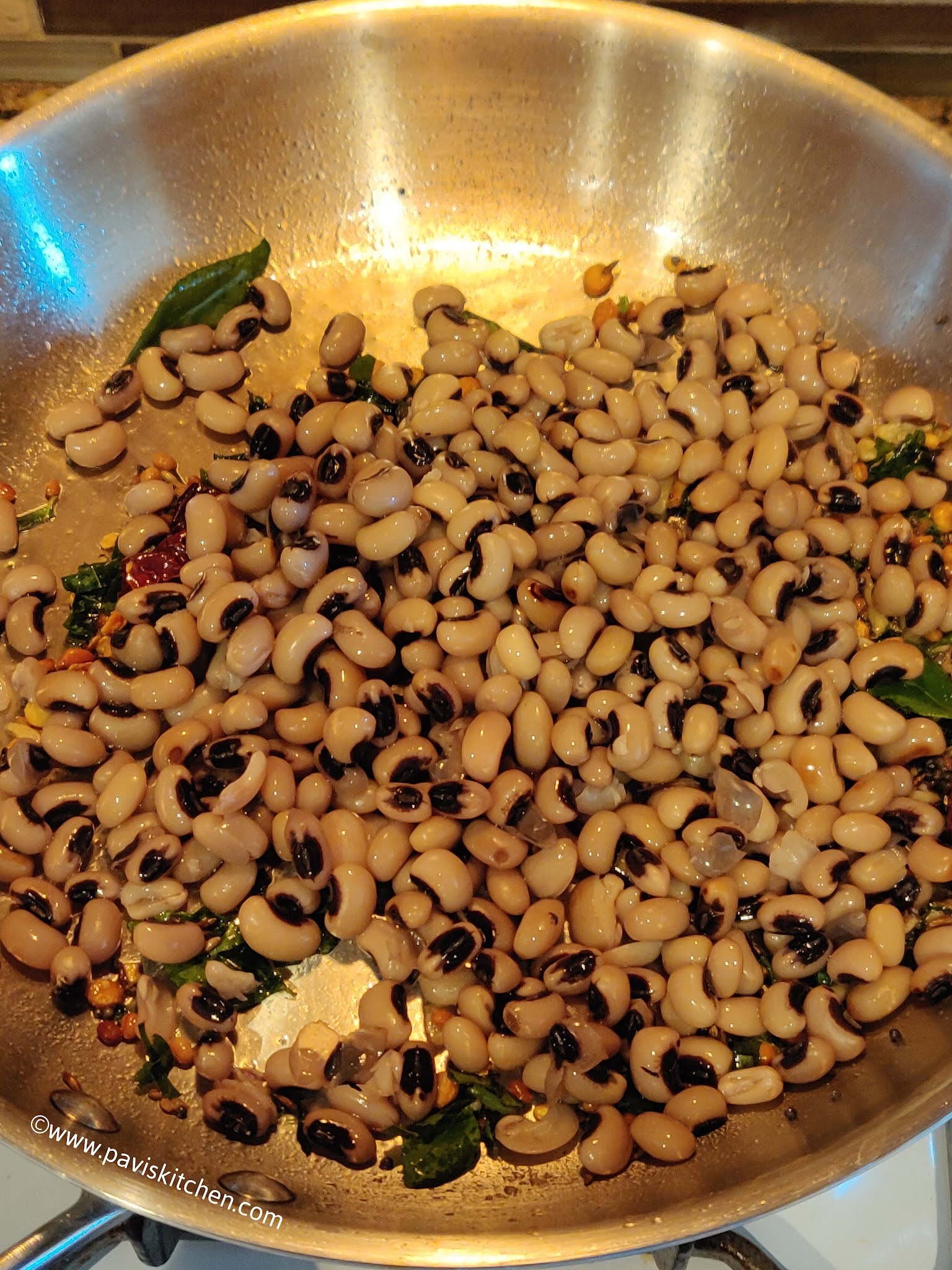
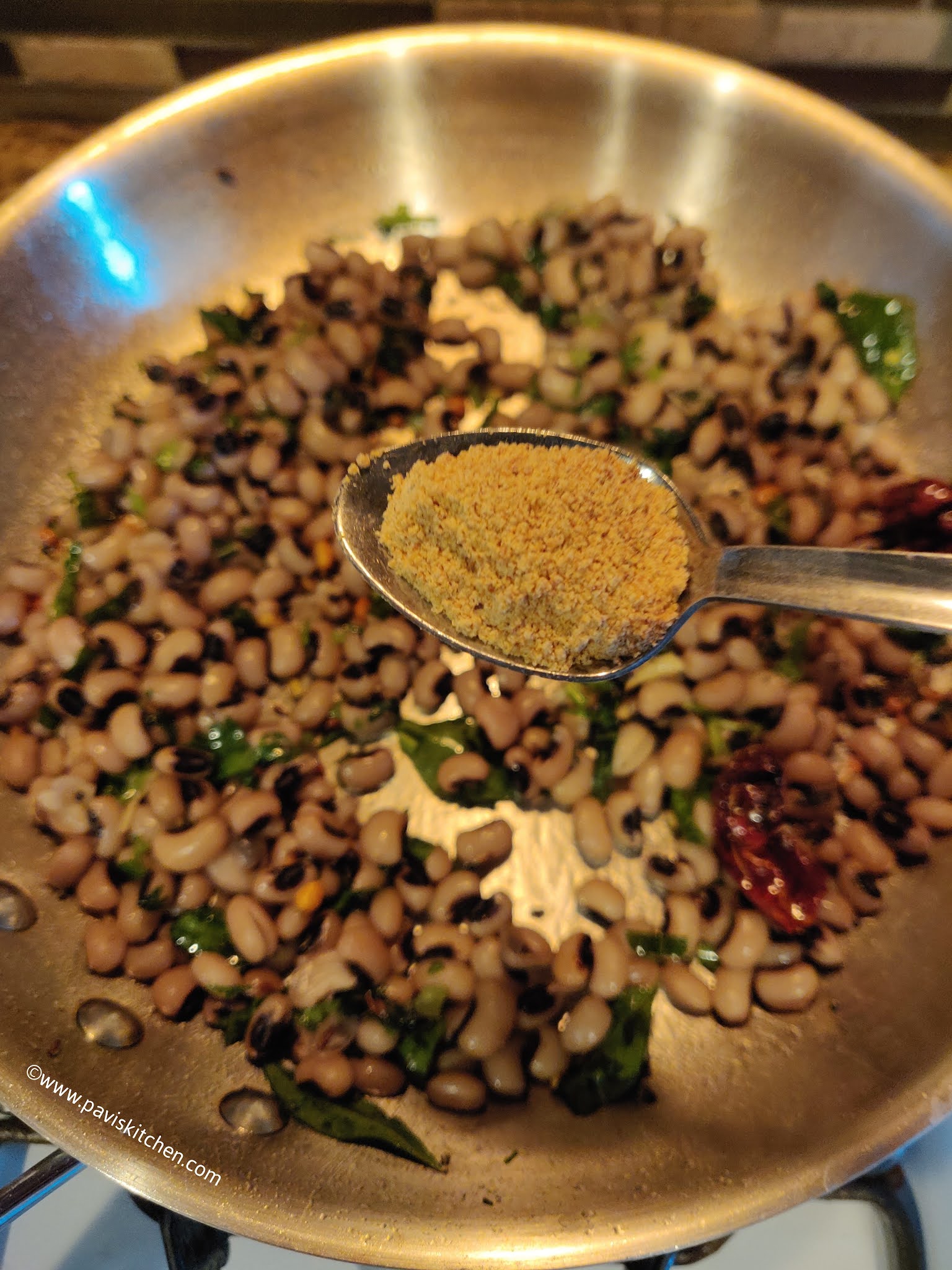

9. Lastly, add some fresh chopped cilantro and turn off the
flame.

10. Karamani sundal/lobia sundal is ready to be served.

Recipe card:
If you try this recipe and love it, leave a comment and a star rating. Thank you for your love and support!!!
Yield: 2

Karamani sundal recipe | black eyed peas sundal | white karamani sundal | lobia sundal | thatta payaru sundal
Karamani sundal is a healthy and easy savory snack recipe made with steamed black-eyed peas/beans, chilies, coconut, curry leaves, cilantro, etc. It is a vegan snack and no onion no garlic recipe. It is high in protein, complex carbs, and dietary fiber.
Prep time: 5 MinCook time: 20 MinSoaking time: 8 HourTotal time: 8 H & 25 M
Ingredients
Beans, herbs, spices and oil.
Instructions
How to make karamani sundal:
Notes:
1. Coconut oil gives a nice aroma and flavor to the sundal.
2. Sundal powder/podi is optional.
3. Grated coconut is also optional, and adjust salt and chilies as per taste.
Nutrition Facts
Calories
438.03Fat (grams)
23.52Sat. Fat (grams)
14.94Carbs (grams)
50.59Fiber (grams)
12.19Net carbs
38.40Sugar (grams)
24.07Protein (grams)
9.90Sodium (milligrams)
1346.66Cholesterol (grams)
0.53Disclaimer - Nutrition information is calculated using an ingredient database and should be considered an estimate.
Check out my legume-based salad recipes as
well. Clickable URL links are given below!

CowPeas/black-eyed peas/Karamani health benefits:
1. Black-eyed pea is a low-calorie legume.
2. Good for weight loss.
3. Rich in fiber and protein.
4. High in antioxidants.
5. Good for skin.
6. It contains folate and potassium.
7. Rich in vitamin A which is good for eye health.
8. It boosts immunity.
9. Cowpeas are rich in iron which helps to prevent anemia.
10. Regulates blood pressure.
Health benefits of coconut:
1. Coconut is packed with nutrients, vitamins, and minerals.
2. Rich in fiber.
3. It contains healthy fats and is a great source of protein.
4. It promotes weight loss.
5. Good for skin and hair.
6. Excellent source of minerals such as magnesium, potassium, iron,
copper.
7. It contains zinc and selenium, which are required to maintain
thyroid levels.
8. It is a great moisturizer for the skin and protects it from the
sun.
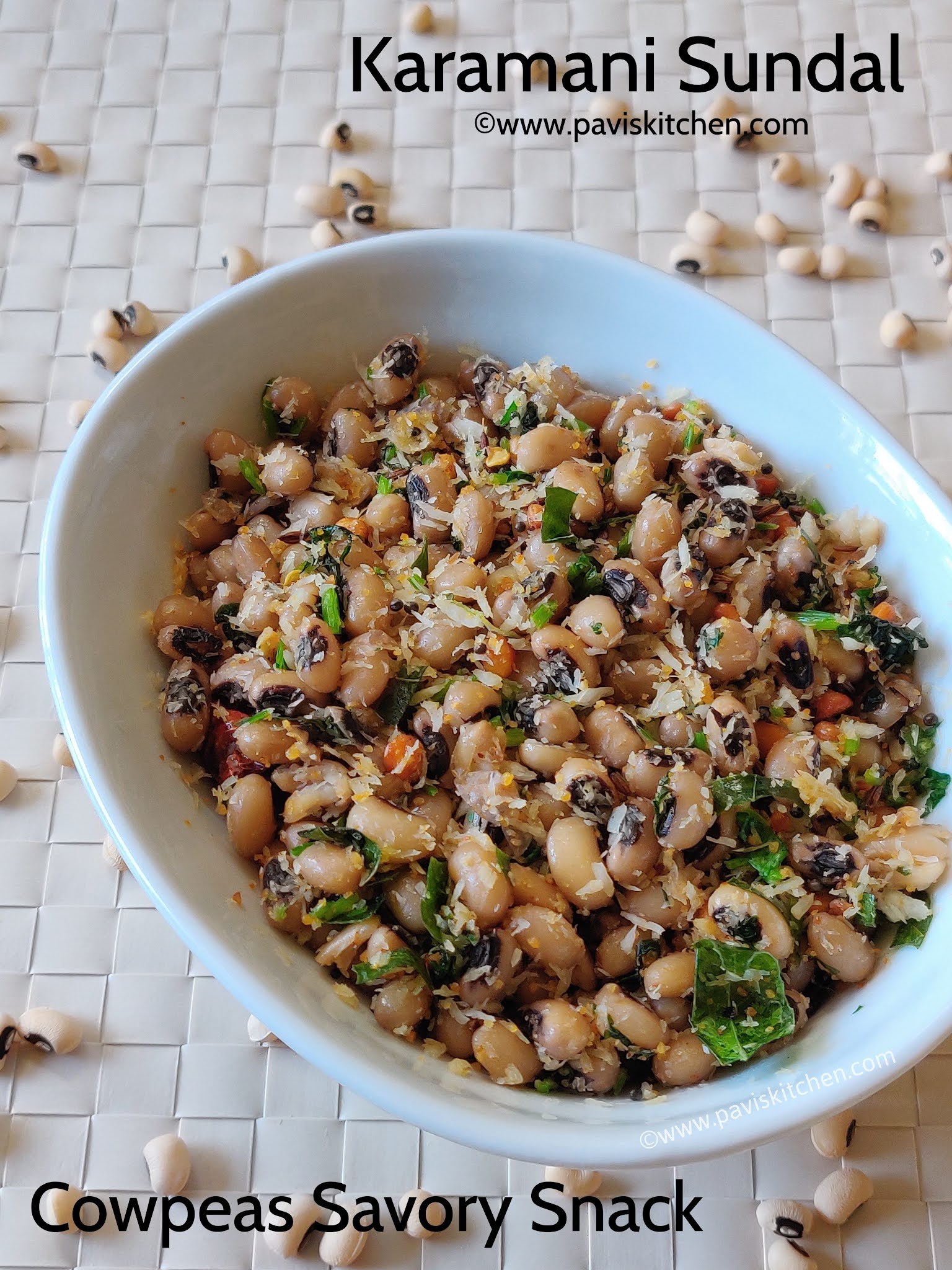
Health benefits of cilantro:
1. Coriander relieves skin inflammation.
2. Lowers cholesterol and blood sugar levels.
3. Regulates blood pressure.
4. Aids with digestion.
5. Boost immunity
6. Promotes digestion and gut health.
7. Reduces acidity.
8. Prevents anemia.
9. Anit-inflammatory effects.
10. Good for eyes and skin.
*(Health benefits are taken from Google and
Wikipedia).

If you try any of my recipes, please mention @paviskitchen and share it on social media using the hashtag #paviskitchen on Instagram, Twitter, Facebook so that I can see your lovely
picture.
If you like my creations, share them with your friends and family.
Also, show your love and support by following me on social media.
Thank you for viewing this recipe. See you soon with another interesting dish. Happy cooking and have a
wonderful day!

Learn Karamani sundal recipe | black-eyed peas sundal | white
karamani sundal | lobia sundal with step by step photos, health
benefits, and calorie chart.
Disclaimer & Copyright Information - All photos
are taken by me (Pavithra) and are copyright protected. All
articles and recipes on this website are written by me, so copying
and reusing any text here for your website/blog is not
allowed.
All photos, articles, and recipes are written on this website are
owned and copyrighted by Pavi's Kitchen. It takes a lot of time
and hard work to write and click my food photos. Please do not
copy unless you have my prior permission to do so.
Suppose you are a YouTuber and fellow food blogger, and you would like
to use any of my (Pavi's Kitchen) recipes on your blog. In that case,, you may do
so, but please write the recipe in your own words and do not copy
any of the text and photos used on the original recipe posted on
my website. You must certainly need to link back to my recipe post
URL on Pavi's Kitchen. Thank you for understanding and
co-operation.
Amazon Associate disclosure:
Pavi's Kitchen (Pavithra) is a participant in Amazon Services
LLC. Associates Program, an affiliate advertising program
designed to provide a means for sites to earn advertising fees
by advertising and linking to www.amazon.com.
This page contains affiliate links, meaning we get a commission
if you decide to purchase through any of the links at no cost to
you. As an Amazon Associate, I earn from your qualifying
purchases.




0 Comments